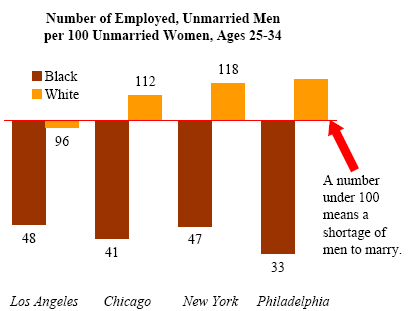Because individual well-being is so dependent on family connections and shared resources, the question of who gets a family, and what kind of family they get, is an important one for inequality in our society. Both children and adults may be denied the opportunity to form or live in the families they need by forces outside of their control. Some of those forces are just the luck of the draw, of course, but others are the result of the economic and political actions of others, actions we should try to understand and change.
Here's some new information on barriers to family life for Black children and adults.
Children
A measure of the society's meritocracy is the extent to which advantage and disadvantage are passed from parents to children. No matter how faithfully we reward individual effort, unequal starting points undermine the premise of fairness -- children may be punished for, but they may not be responsible for, the behavior of their parents. As an example, I have recently noted that children lose parents when the legal treatment of their parents' behavior denies children the right to a family and authorities deport their parents.
Now we have learned that the American prison boom has rained down a special kind of punishment upon a select group of vulnerable children. In a recent study published in the journal Demography, Christopher Wildeman concludes, "parental imprisonment has emerged as a novel -- and distinctively American -- childhood risk that is concentrated among black children and children of low-education parents." His shocking finding, based on children born in 1990, is that more than a quarter of all Black children -- and more than half of those whose parents didn't finish high school -- experienced their fathers' incarceration by the age 14. That compares to 1-in-25 White children. Blame who you want, except the children themselves.
Adults
In The Truly Disadvantaged, sociologist William Julius Wilson suggested that one reason why marriage rates were declining among inner-city Black women was because of a shortage of men available to marry. More recent research suggests this does contribute to lower marriage rates, although it is not the only cause.
A shortage of marriage partners may be the result many factors. It may just be that the marriage you want is illegal, as was the case for American slaves in the past, or most same-sex couples today. Or it may be a demographic issue, such as the marriage squeeze experienced by Chinese men in the past, when rich men took multiple wives and many girls did not survive childhood.
As suggested by the analysis of incarceration's effect on children, in our case prison is part of the problem, as are higher rates of mortality among Black men. Because people usually marry someone close by, the concentrated pockets of demographic shortage make themselves felt among very targeted groups. Cultural norms also play a role, as in the expectation that a man should have the job before he is considered marriage material. Finally, the vast majority of American marriages still take place within-race, most especially marriages involving Black women.
Thus, for a combination of reasons, the numbers are against black women, especially those in inner cities. How bad is it? I just did a little checking, and was shocked myself by what I saw. In four of our biggest cities, Los Angeles, New York, Chicago and Philadelphia, unmarried young Black women outnumber unmarried, employed Black men in their age group by more than two-to-one (three-to-one in Philadelphia). The rest of the Black men are married, in prison, unemployed, in the military or dead. White women, on the other hand, actually face a surplus of men in three of the four cities.

Source: My analysis of data from the American Community Survey, 2005-2007, retrieved from iPUMS.org.
Again, blame who you want for the larger pattern, but it is hard to see how a young Black woman growing up in Philadelphia could be responsible for the demographic imbalance she faces. When the numbers go against you, the decisions you make are affected in ways others may not easily understand.
This pattern is only such a problem because individual well-being is so dependent on family connections and shared resources. Our social safety net, such as it is, relies on family care and support to back it up. The way we run our market mechanisms offers distinct advantages to people in families. People without families -- children without parents, and parents without spouses in particular -- face an uphill climb that is usually not of their choosing. As long as people need families, those who can't have them will pay a heavy price.